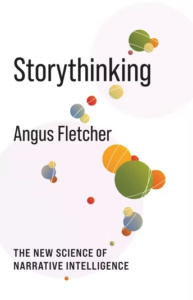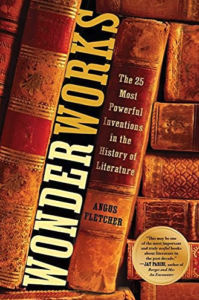What if (spoiler alert) all the wisdom of writing, storytelling, problem-solving, adventure, crisis management, and deep learning could be summed up in a two-word phrase?
Thanks to Angus Fletcher, a leading authority on storytelling and the brain, we know that two-word phrase: “What if?”

 Fletcher, the author of the landmark work Wonderworks: Literary Invention and the Science of Stories (2021) and the forthcoming Storythinking: The New Science of Narrative Intelligence, says the brain has evolved to be creative. We abuse that creative brain in our bureaucratic, mechanized, mediated, overwhelming society. But the brain remains ready to take its place as the out-of-box imagineer and battler against stale ideas.
Fletcher, the author of the landmark work Wonderworks: Literary Invention and the Science of Stories (2021) and the forthcoming Storythinking: The New Science of Narrative Intelligence, says the brain has evolved to be creative. We abuse that creative brain in our bureaucratic, mechanized, mediated, overwhelming society. But the brain remains ready to take its place as the out-of-box imagineer and battler against stale ideas.
Fletcher is the professor of story science at Ohio State’s Project Narrative. He not only teaches and writes books, but also consults with the Army and Hollywood. He teaches them how to do what comes naturally, until we’re denatured by modern life: How to soak up the world with a sense of wonder and then to create a strikingly original approach to living the best life.
OK, back up.
Fletcher’s basic insight is that human’s don’t just create and enjoy stories. Stories are not somehow some thing “out there.” Stories organize all our experiences. No, that’s not quite right; it still suggests that stories are outside of us. We are stories. Stories as as much a part of our experience as blood and organs and skin and bones and sinews. Just as we must understand all those elements of life to understand health, we need to understand the elements of storytelling to understand experience.
“Storythinking hails from a time prior to authors, prior to humans, prior to language,” Fletcher writes in Storythinking. “It dates back hundreds of millions of years to the first creaky machinery of the animal brain.”
Cogito, ergo sum? Actually, Diigoúmai, ergo sum—or, I tell stories, therefore I am. “The human brain empowered our Stone Age ancestors to respond to unpredicted challenges and opportunities by linking creative actions into new plans—which is to say, new plots. That hatching of plots was narrative cognition.”
Humans think and operate in two ways: logic and narrative. “Analytically, story and logic employ different epistemological methods,” Fletcher notes. “Logic’s method is equation, or more technically, correlational reasoning, which inhabits the eternal present tense of this equals that. … Story’s method is experiment, or more technically, causal speculation, which requires the past/present/future of this causes that.” Or: What if?
Think about that a minute. The more maniacally we embrace facts ripped from context, standardized testing, getting the “right answer,” an so on, the less capable we are of storythinking. And storythinking is essential to the human experience.
Fletcher suggests three major skills to improve storythinking:
- Prioritizing the exceptional: Finding what’s unpredictable, surprising, weird, deviant, extreme, shocking, even gross or repellant. That’ll get attention, right?
- Perspective shifting: Imagining being someone completely different—not just with a nice, cozy empathy, but with a kind of embodiment of another. Getting out of your own skin, as extremely or totally (see 1, above) as possible.
- Stoking narrative conflict: Testing ideas and scenarios as a kind of epic battle that takes you “boldly … where no man has gone before” (catchy phrase, no?). Submit characters and situations to stress tests that take the storythinker’s mind far beyond where it was before.
Fletcher’s story has more than its share of plot twists. After four years in the neurophysiology lab at the University of Michigan Med School, he decided to focus on storytelling. He learned from the best, studying Shakespeare for his Ph.D. in literature at Yale. Then, at Stanford, he connected with Pixar storytellers and became a script writer for TV and movies. He has also worked with the Army Special Corps.
I recently spent an hour exploring these issues with Fletcher on the phone. But the recorder wasn’t working. (This was my “all is lost” moment.) So rather than giving you his word-by-word account, I offer a paraphrased summary. Fletcher okayed my summary of our conversation.
 On the brain, evolution, and storytelling …
On the brain, evolution, and storytelling …
The brain is not a computer. It’s a way of experiencing the world. It’s not like we just gather data and then assemble those data. To be sure, we often develop stories out of information that we have stored in our brains, at different levels including the subconscious. But even more important, we create stories to produce something, not just organize information. We can actually produce stories out of nothing. We can actually create whole new worlds.
That’s what scientists do. They are always telling stories, trying to figure what will happen in this situation and that situation.
Over the course of human evolution, humans have not only mastered the art of storytelling—and, in turn, been shaped by stories. The human experience is itself inseparable from storytelling. Humans could never step out of storytelling even if they tried.
On the clutter of the modern mind …
We once had the ability to imagine something out of nothing. Before modern technology, we had to entertain ourselves when we were bored. We had to observe and imagine. But now every time we get bored, we turn to our iPhone. The best thing we could do to reignite our imagination is to smash our phones.
When we come into a room, we don’t notice anything unless something is out of place. Babies and toddlers, when they come into a room, they see something new every time. Even if that room is familiar, they look at the details in a room with fresh eyes every time. They don’t assume that anything is going to be the same way. In a way we have to recover our ability to look and observe like two-year-olds.
On the need to slow down and notice things, detail by detail and moment by moment …
People automatically make causal arguments and take all the interesting details out of the equation. They say X causes Y. But in fact, there are lots of other factors involved besides X and Y. The blandest ideas come from sanding over the details.
We are a storytelling species, to be sure, but we’re also a summarizing and simplifying species.
When we think that X causes Y, we have to push ourselves to see how X causes x1, x2, x3, and so on—actually more than that, like y1, y2, y3, et cetera—before getting anywhere close to Y.
Of course, as a writer and a storyteller, you don’t want to overwhelm people in details. You want stories to offer some coherent view of how the world works. You want stories to explore a coherent “What if?”
On ever-evolving genres …
Genres are not eternal. Working within genres, we need to twist and combine genres. Genres are always being invented and reinvented to put storytelling on new paths. (On the topic of genres, see the interview with John Truby.)
A number of important genres, like the Western or Detective story, are reflections of modern life. They could not have been imagined before the settling or urbanization of America. Science fiction is another new genre. In ten years, someone might discover or invent a completely new genre, like Poe did with the Detective genre.
On the power of unusual, surprising, shocking, and even perverse experiences …
The best skill writers could develop is to notice things better. Look for what’s out of the ordinary. Notice what you don’t see right away. Stretch your mind and imagination to include what you don’t see right away … and what you don’t see at all.
Every great advance in storytelling comes from doing something deviant and disruptive. Some examples include Hamlet, The Decameron, and Don Quixote.
What makes those stories so fascinating is that they do something completely different. In Hamlet, an action story, you have this thoughtful character who is thinking like a philosopher. In Don Quixote, the characters themselves are reading Don Quixote! Who would think of that? Only a “What if?” creator.
Take a modern example. Better Call Saul is immediately exciting and engaging because, in the very first episode, it does two things. First, it introduces a complete set of divergent characters. Second, it creates some very strange worlds that the audience probably has never imagined before. A case in point is the home of Chuck, Jimmy’s brother. Chuck is living in a house wrapped in aluminum foil and devoid of all electronics because of his belief that microwaves are messing with his body and mind. That’s a strange character and a strange world. And we want to know more.
Better Call Saul is an elaborate “What if?” story. The characters are believable in their own ways but also stretched beyond their own experiences. What if there was a lovable con-man lawyer whose life is dominated by his domineering and troubled brother? What if that lawyer got involved in a wild range of experiences that take him to skateboarding stoner conmen to drug dealers to a sweet, wry fellow lawyer to an Asian hair salon, et cetera?
On the structure of experience and stories …
In a sense, all kinds of experiences seem to take Aristotle’s format: beginning, middle, and end. Something prompts you to pay attention, then you process the idea, and then you resolve it.
Actually it doesn’t work quite that way. When you hear a dog bark, you’re actually in the middle of the story, not the beginning. That bark prompts you to work backwards to figure out what made the dog bark. And then you look into the future to see what’s going to happen next. It’s the familiar storyteller’s approach: in media res. You start in the middle of the action.
In all our everyday experience, we’re constantly looking backward and forward at the same time. Storytellers, take heed: Just saying who does when and when and how is not really a story. Story requires a structure that engages the reader in saying (you guessed it), “What if?”
On deliberate training to see, notice, and tell fresh stories …
Working with the Army Special Corps, one of their most important skills is to react constructively to strange and unexpected circumstances. They can’t just respond with the three automatic actions: fight, flight, or freeze. They have to respond more imaginatively. In those circumstances, where absolutely nothing is familiar, they have to learn how to construct a brand new story, not just fall back on familiar stories. That takes discipline and skill. They need to be able to imagine a diversity of possibilities—not only a whole batch of factors that led to the moment, but also a bunch of possibilities that might happen in the future. This takes discipline. That takes an extra brain muscle that they have to develop.
Until about 20 years ago, the military lived and worked in a world of “hurry up an wait.” They experienced a lot of dead time. Now soldiers are allowed to have cellphones with them so they fill that dead time. They would be better off observing and thinking. That’s the most important thing that artists do. They wander around, thinking and observing and speculating. To outsiders, it looks like they’re doing nothing. But really, they’re doing the most important thing—noting what other people don’t notice and thinking about the world in fresh, different ways.
On the power of fresh details …
Storytellers who think that everything comes from Aristotle or the Hero’s Journey don’t understand that a story’s energy and intrigue comes from the surprises. When a story fits a simple format (like the Hero’s Journey), it won’t be able to hold the attention of the viewer. It will be too familiar. After a while, the audience will turn away.
On the importance of asking “What if?”
“What if?”is the ultimate question for the brain and the storyteller and the audience. We need to imagine what might happen, outside of ordinary circumstances. We need to be able to construct whole new worlds.
Inventive and expectation-busting stories make the audience ask “What if?” They get us out of out of own world and into a wholly new place where we can imagine things in completely different ways.
Other Resources
- “Three Exercises to Boost Your Team’s Creativity” (Harvard Business Review)
- “Why Computer AI Will Never Do What We Imagine It Can” (Project Muse)
- A new method for training creativity: narrative as an alternative to divergent thinking (Annals of the New York Academy of the Sciences)
- Optimizing Machines Is Perilous. Consider ‘Creatively Adequate’ AI (Wired)
Before you go . . .
• Like this content? For more posts on writing, visit the Elements of Writing Blog. Check out the posts on Storytelling, Writing Mechanics, Analysis, and Writers on Writing.
• For a monthly newsletter, chock full of hacks, interviews, and writing opportunities, sign up here.
• To transform writing in your organization, with in-person or online seminars, email us here for a free consultation.

